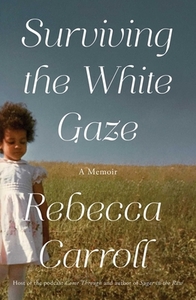Take a photo of a barcode or cover
I really wanted to like this book. I just could not get into it at all. So much of it felt like fiction to me. Not to discredit the author's reflection of her childhood but who on earth can remember that much detail about things. The extra embellishments seemed fictional to me and started to annoy me. I don't remember a scene with that much detail from when I was 11 (right down to the pop cans in the yard and a cars and motorcycles). The story itself was okay but this could have used a better editing job to cut down on a lot of the details that were not necessary for telling the story.
emotional
reflective
medium-paced
reflective
medium-paced
adventurous
challenging
dark
reflective
sad
tense
medium-paced
emotional
reflective
medium-paced
challenging
emotional
reflective
slow-paced
I enjoyed this memoir but there were parts that didn't ring true for me. It felt superficial at times.
Writer and cultural critic, Rebecca Carroll’s memoir “Surviving the White Gaze” tells her compelling story of being a biracial Black child adopted by White parents and coming of age in a predominantly White New England community.
Carroll walks us through her complex journey of racial identity development as a Black girl in 1970s & 1980s New Hampshire. She shows how early on, she recognizes how Whiteness is, in many spaces, seen as the standard of beauty, sophistication and intelligence.
What complicates things even further is Carroll’s relationships with those closest to her. Her parents operate off of the ideology of being well-meaning white folks, who practice a “colorblind” approach to race.
Her White biological mother, who she meets as a teen is a PIECE OF WORK. She fetishizes Black men, promotes racist Black stereotypes and, in many ways, attempts to sabotage Carroll’s racial identity development... I was angry for the author when reading certain parts.
However, what makes this book triumphant is seeing Carroll show us how she literally went out of her way to curate Blackness in her life by seeking out Black friends, Black literature, Black cities and Black educational experiences.
I honestly think this book could be a miniseries. It’s timely, and could be incredibly informative for many types of people. From Black kids and young adults navigating white spaces, to White parents with Black children, and even educators, students, etc.
This is a riveting memoir which I believe we’ll be hearing a great deal about in the years to come.
Carroll walks us through her complex journey of racial identity development as a Black girl in 1970s & 1980s New Hampshire. She shows how early on, she recognizes how Whiteness is, in many spaces, seen as the standard of beauty, sophistication and intelligence.
What complicates things even further is Carroll’s relationships with those closest to her. Her parents operate off of the ideology of being well-meaning white folks, who practice a “colorblind” approach to race.
Her White biological mother, who she meets as a teen is a PIECE OF WORK. She fetishizes Black men, promotes racist Black stereotypes and, in many ways, attempts to sabotage Carroll’s racial identity development... I was angry for the author when reading certain parts.
However, what makes this book triumphant is seeing Carroll show us how she literally went out of her way to curate Blackness in her life by seeking out Black friends, Black literature, Black cities and Black educational experiences.
I honestly think this book could be a miniseries. It’s timely, and could be incredibly informative for many types of people. From Black kids and young adults navigating white spaces, to White parents with Black children, and even educators, students, etc.
This is a riveting memoir which I believe we’ll be hearing a great deal about in the years to come.
3.5/5 The writing at the beginning and the end were so different. At the start it was obnoxiously flowery. Too many dripping descriptions of every noun. Once through the first chapters it becomes more a comfortable style.
I think everyone should read this, especially people who are too comfortable ‘not seeing race’
I think everyone should read this, especially people who are too comfortable ‘not seeing race’





